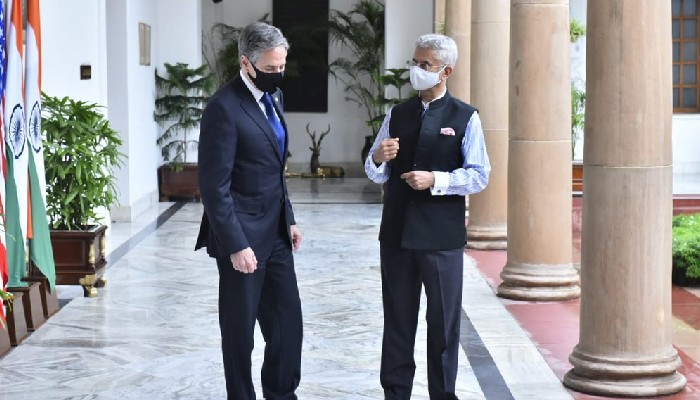“Unilateral imposition of will by any party will not be democratic and can never lead to stability in Afghanistan,” Jaishankar said
External Affairs Minister S Jaishankar on Wednesday said Afghanistan must neither be home to terrorism nor resource of refugees. He said the world wishes to see an independent, sovereign, democratic Afghanistan and that it is essential for all stakeholders to take peace negotiations over the war-ravaged country “seriously.”
“The world wishes to see an independent, sovereign, democratic and stable Afghanistan at peace with itself and with its neighbours but its independence and sovereignty will only be ensured if it is free from malign influences,” Jaishankar said in his press statement after India-US Ministerial meeting at Hyderabad House in New Delhi.
Referring to the Taliban who don’t want to run Afghanistan according to modern, democratic norms rather as per Islamic system, the EAM said, “Unilateral imposition of will by any party will obviously not be democratic and can never lead to stability nor indeed can such efforts ever acquire legitimacy. The gains to Afghan Civil Society especially on the rights of women, minorities and on social freedoms over the last two decades are self-evident; we must collectively work to preserve them.”
While referring to India-US cooperation on the Indo-Pacific, he said the region presents a different set of challenges to stability, growth and prosperity.
“Under the aegis of the quad framework, we are engaged on maritime security, HADR counterterrorism, connectivity and infrastructure, cyber and digital concerns, COVID-19 response, climate action, education and resilient and reliable supply chains,” he said.
The EAM maintained that during his talks with the visiting Secretary of State, focus was also laid on the importance of observing international law, rules and norms, including UNCLOS.
He said close work between India and the US at the bilateral front or at multilateral front, including the Quad benefits the international community as a whole.
“Developments in India's extended neighbourhood are also naturally of great consequence to us. Stability in the Gulf where our political, economic and community interests are so visible was a shared concern,” he said.
On Myanmar, the EAM maintained that India is committed to the South-East Asian country’s democratic transition and supports the ASEAN initiative. This initiative calls for ending violence, constructive dialogue among all parties, a special ASEAN envoy to facilitate the dialogue, acceptance of aid and a visit by the envoy to Myanmar.
Jaishankar told the media that both sides also discussed India's approach towards reformed multilateralism, reflecting global realities of the present times.
“Some of the agenda before the UNSC was also covered in our discussions as also our approach to reform multilateralism. Countering terrorism has been the common endeavour for us in the UN Framework, bilaterally and in other bodies. We are convinced that the world will never accept cross border terrorism,” he said.
According to the EAM, issues like Climate Change, Agenda 2030, Covid-19 challenges, expansion of vaccine production to make it globally affordable and accessible, travel challenges resulting from Covid-19 were discussed during his talks with the visiting US Secretary of State.
 Contact Us
Contact Us  Subscribe Us
Subscribe Us









 Contact Us
Contact Us
 Subscribe
Subscribe
 News Letter
News Letter

